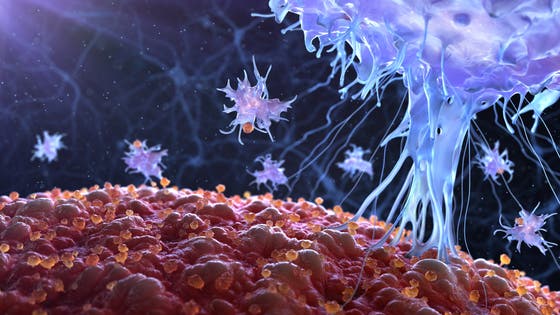Mar 30: How does the immunological memory work?

Much is known about immune cells in blood today. But that does not apply to immune cells in tissues, such as the bone marrow, intestines or skin. UMC Utrecht researcher Dr. José Borghans investigates how immunological memory in the tissues is preserved. In February she was awarded a Vici grant of € 1.5 million for this research.
T cells are white blood cells that play an important role in the immune system. They are in the blood, but from the blood they also enter tissues and lymph nodes. For example, treatment of inflammatory diseases in the intestine focuses on T cells. They also play an important role in vaccinations and in immunotherapy for cancer. That is precisely why researchers such as José Borghans (Center for Translational Immunology, UMC Utrecht) try to map the life of T cells. Those cells provide our immunological memory. “We can investigate T cells very well in blood, but this contains only two percent of these cells. The other 98 percent is in the lymph nodes, spleen, bone marrow, intestines, skin and other tissues, "says José. “You can be completely misled if you only look at cells in the blood, in one place and at one time. How can you find good treatment for a bowel disease if you don't know if the T cells in the gut behave the same as in the blood?”
Replenish memory
The immunological memory in the tissues determines the long-term activity of the immune system. For this, T cells must either live for a very long time, or divide regularly or be replenished (for example from the blood). Recent research by José Borghans and her co-PI Dr. Kiki Tesselaar has shown that T cells from the bone marrow sometimes ‘travel’. They then divide in a different place, for example in the blood or lymph. Subsequently, they return to the bone marrow and retain our immunological memory there. Using a new method with deuterium-labeled water, it is possible to measure over time how quickly T cells are replenished in tissues. Deuterium can then be detected in T cells that have divided. The percentage of cells with deuterium thus reveals how quickly T cells are renewed. Deuterium is harmless and disappears from the body after a while.
Thanks to the Vici grant, José and het group can investigate exactly how this process works in the bone marrow and in the skin of healthy people. Because quite a lot of skin is needed for the study, Jóse is looking for participants who get a tummy tuck after they had accelerated weight loss in a short time. “We examine the skin that remains after surgery. Before surgery, they are all given heavy water for several weeks. This allows us to measure for the first time in healthy people how immune cells in the skin are preserved.” Using similar research, José will monitor the behavior of T cells in the bone marrow of healthy people. This is not yet possible for many other tissues. She will compare the results obtained in mice and humans with mathematical models. Mathematicians and experimental immunologists have been working together in her group for years.
Drug lead
José ultimately wants to improve the treatment of chronic conditions such as Crohn's disease. “T cells in the gut play a role in this disease. Research into treatments now focuses, among other things, on the movement of T cells from the blood to the intestine. But actually we first need to know how the T cells maintain the immune memory of the gut. Then you have an idea with which type of medicine you have to come up to slow down that. ” The same applies to immune therapy for cancer. “In some promising cancer therapies, T cells are administered to patients. But T cells come in different types, and not all of them work equally well. Long-lived or rapidly dividing T cells can long contribute to immunological memory against cancer. Only when you know to which cells this applies, one can develop a drug lead that with sustained activity. I want to work towards that. I am very passionate about fundamental research, but of course it is all about ultimately leading to a clinical application.”
